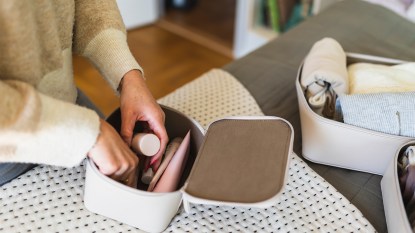What To Do About The 5 Most Common Vaginal Issues, According to a Gyno

Sure, talking about a strange-smelling vagina is about as uncomfortable as running into your ex while dressed in your Sunday’s best (read: a pair of pants you may or may not have slept in the night before). But, trust us, by doing so, you could actually save yourself a whole lot of totally unnecessary down-there drama in the future.
So, if you have ever asked yourself, “Is my discharge normal?” or “What are those lumps and bumps really all about?” read on. Dr. Dasha Fielder of Sapphire Family Medical Practice is here to answer five of the most (literally) burning questions you’ve ever had about your ladybits.
One of the Most Common Vaginal Issues: Itching
Even if you are one of those “blessed” few who hasn’t had to deal with a weekend-ruining bout of thrush, we hate to break it to you, but 75 percent of women will experience vaginal issues or some sort of vaginal discomfort in their lifetime.
According to Dr. Fielder, vaginal itching can be associated with either a fungal infection like thrush or dermatitis. “If you are experiencing vaginal itch, it is always best to see your doctor and work out the cause of your symptoms,” she says. “In most cases, a doctor will examine the area and might take some swabs and prescribe appropriate treatment to use.”
Discharge
The word discharge has a much bigger effect on your body than merely causing you to physically cringe at the very thought of it. “Vaginal discharge can be normal but it can also be a sign of infection,” Dr. Fielder explains.
Most women have physiological discharge that is usually increased during the time of ovulation (it is generally clear and does not have an unpleasant odor and is not associated with any other symptoms).”
“If you have a new discharge, especially if it has unpleasant smell associated with it, or is thick, yellow, bloody or is associated with itching, burning or pain, see your PD.”
Vaginal Dryness
If you’ve ever experienced this, you’ll know that it can be particularly frustrating during sex. “Your vagina has a natural lubrication produced by glands that respond to arousal. In the majority of cases, appropriate lubrication will occur if foreplay is long enough,” says Dr. Fielder.
As Dr. Fielder points out, all women’s bodies are different, meaning that lubrication levels can certainly vary. “If you feel that your vagina is always dry, my trick is to use longer foreplay prior to penetrative intercourse,” she says.
And if that doesn’t work? Dr. Fielder suggests using lubricants available on the market to avoid any sexually induced abrasions and discomfort.
Lumps and Bumps
Lumps and bumps, as Dr. Fielder explains, have no place in or near your vaginal area. “Lumps or bumps may indicate a sexually transmitted infections,” she confirms. “If you notice them, please book an appointment with your doctor. It is important to perform appropriate tests and treat any infection early.”
Weird Smells
In news obvious to every woman ever, the thought of smelling less than fresh downstairs can feel slightly mortifying. However, just remember that this may, in fact, be an indication of a treatable infection that is best to be examined sooner rather than later.
“Physiological discharge should not have an unpleasant smell,” says Dr. Fielder. “If you have an unusual smell it might be a sign of infection. It is best to discuss it with your doctor as soon as possible and have appropriate testing and treatment.”
Rules Every Woman Should Know
Dr. Fielder says to ensure you have good vaginal health and avoid vaginal issues, it’s important that you follow a few basic principles.
- Wear cotton underwear and avoid all synthetic material
- Use warm water for washing, and avoid soap and perfumed products
- During menstruation, change sanitary products regularly and if possible, gently wash of the area
- Use non-perfumed toilet paper, and wipe front to back
If you have any questions about your own vaginal, sexual, or general health, be sure to book an appointment with your trusted OB/GYN.
This article originally appeared on our sister site, Now to Love.













